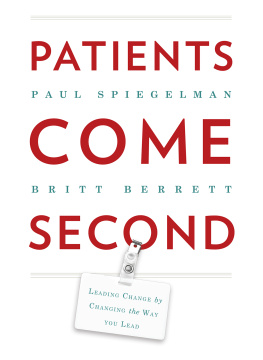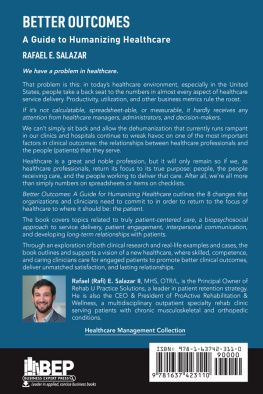
AN INC. ORIGINAL
New York, NY
www.inc.com
Copyright 2013 Paul Spiegelman and Britt Berrett
All rights reserved.
No part of this book may be reproduced, stored in a retrieval system, or transmitted by any means, electronic, mechanical, photocopying, recording, or otherwise, without written permission from the copyright holder.
Distributed by Greenleaf Book Group LLC
For ordering information or special discounts for bulk purchases, please contact Greenleaf Book Group LLC at PO Box 91869, Austin, TX 78709, 512.891.6100.
Design and composition by Greenleaf Book Group LLC
Cover design by Greenleaf Book Group LLC
LCCN: 2013900576
Ebook ISBN: 978-1-98884-281-6
Ebook Edition
This book is dedicated to the patients and their families who we are so fortunate to serve each day.
CONTENTS
INTRODUCTION
Whats Up with the Title?
Be honest: Why did you pick up this book? Was it because of the title? If so, thats okaywe hoped it might work out that way. But what does the title mean? you might now be asking. As a way to answer that question, kick-start the discussion, and expose the true intent of this book, wed like to share a recent e-mail dialogue we engaged in (with someone who we hope will be reading this book):
Hi, Paul.
I just returned from The Beryl Institute Conference (which was great!), where I heard you discussing your upcoming book, Patients Come Second. I think you should know that among conference attendees, there was a lot of negative discussion about the title. There we were, four hundred patient experience leaders, most of whom have been championing the patient experience for years. And now a respected, prestigious, distinguished leaderyousays, Patients come second.
I am writing because I strongly encourage you to change the title of your book. Is your title catchy? Yes! But you are an influential leader, and to say that patients are behind employees in terms of priority is to give health care leaders more excuses for not holding employees accountable for their behavior toward patients. This also gives employees more reason to say, Im not being cared for well enough in my job, so I cant (or wont) be caring with patients.
I believe that your book title is very destructive and invites reviews and blog posts that will be unnecessarily negative. Will publicity, whether negative or positive, sell books? Perhapsbut I see you as a mission-driven person whobeyond making moneywants to do good in the world. I certainly know that we must create a healthy culture and caring environment for our employees if we expect them to care well for patients, but there is no need to rank the two in order of who is more important, patients or employees. In your book, surely you can make all your points about the importance of the employee experience without using this damaging title.
Thank you for your consideration.
Warm regards,
Wendy L.
This is how we responded:
Hi, Wendy.
Thanks so much for taking the time to write to me. Im glad you enjoyed the conference and sorry we didnt get the opportunity to say hello in person. I also appreciate the feedback on the books title and will share your comments with Britt (my coauthor). Ill genuinely take the suggestion under consideration, but first let me respond here to a few of your concerns.
As you surmised, this project has nothing to do with selling books or making money. I write books to try to deliver a message that can change the way business is done, both inside and outside of health care.
While the title may seem controversial, once you read the book (and I hope you will), youll see that we are all after the same thing: improving the experience for the patient. There was once a popular business book called The Customer Comes Second. That title could have provoked the same response, but it revealed an important truth that spoke to people in the business world. Lets face it: Employees in most companies get treated as second-class citizens. If thats the case, how can we expect them to treat customers well? The same is true for employees in the health care field.
In health care, we need a model for the delivery of a great experience for each patient. It is not a question of ranking what is more important, but a question of leading and lagging indicators of success. In that regard, I firmly believe (and there is increasing data to back this up) that the most successful organizations with the most loyal customers (or patients) have focused first on an internal culture of engagement, where leadership shows a genuine interest in the growth and development of its people. If you do that, accountability will only increase, not create excuses for lack of execution.
When you read the book, you will learn about an ongoing debate between me and Dr. David Feinberg, CEO of UCLA Health System in Los Angeles. He believes that if each employee just focuses on the next patient, he or she will be a happy employee. Dr. Feinberg may be right, but I believe that the better we feel about ourselves, the better we treat others.
Our industry needs to be shaken up a bit. My hope is that our book (with whatever title we finally choose) will stir healthy conversation and action to improve internal cultures in health care. It is sorely needed.
Thanks again for reaching outit sounds as though weve already stirred the pot. I appreciate all the work you are doing in the industry.
Best,
Paul
Since youre reading this now, you might have guessed that although we did consider Wendys suggestion to change the books title, ultimately we stuck with our gut instinct. Why? For the very reasons she was opposed to it: The title is controversial and edgy, and it borders on being offensive. And guess what? That is exactly what we as an industry need in order to bring about change: a big, collective slap in the face! Then we can begin to embrace the responsibility of focusing on the team so we can bless lives with good health. We need to speak openly and honestly about how to improve the patients experience. And that starts with the team doing the work.
Let us reiterate: Our intent in tackling this project isnt to make a bunch of money. The intent is to instigate a passionate discussion that will shake up our industry. Does anyone really believe that we are talking about ignoring the patient? If so, the content on the pages that follow will dispel that notion.
Wendy does raise an interesting point about accountability. But to us, comments like Sure, this is easy to say, but my boss will never support it, or I would like to do all that stuff, but my HR department doesnt get it, or even something like I work in civil service, and we cant do that, are really just poor excuses. If you find yourself saying you cannot give exceptional care to a patient because your team isnt functional, you need to go back to the drawing board. Change your existing team or get a different team. Reorient current resources or pull in new resources. Tweak an existing strategy or create a new strategy. Change a player, change a couple playerschange the way you lead! How else can you expect to care for your patients the way you must?
In our experience, the majority of health care workers want nothing more than to improve the patient experience. Thats why they got into this field in the first place. But it is not always easy for them to do their best work. Ron Swinfard, CEO of Lehigh Valley Health System in Allentown, Pennsylvania, told us in a passionate moment:
I really dont give a damn what model the federal government or the state government inflicts on us for how they want us to deliver care. As long as we as providers care about our patients and one another, well be successful. People will beat down our doors to get here, because theyll feel it.
Next page








